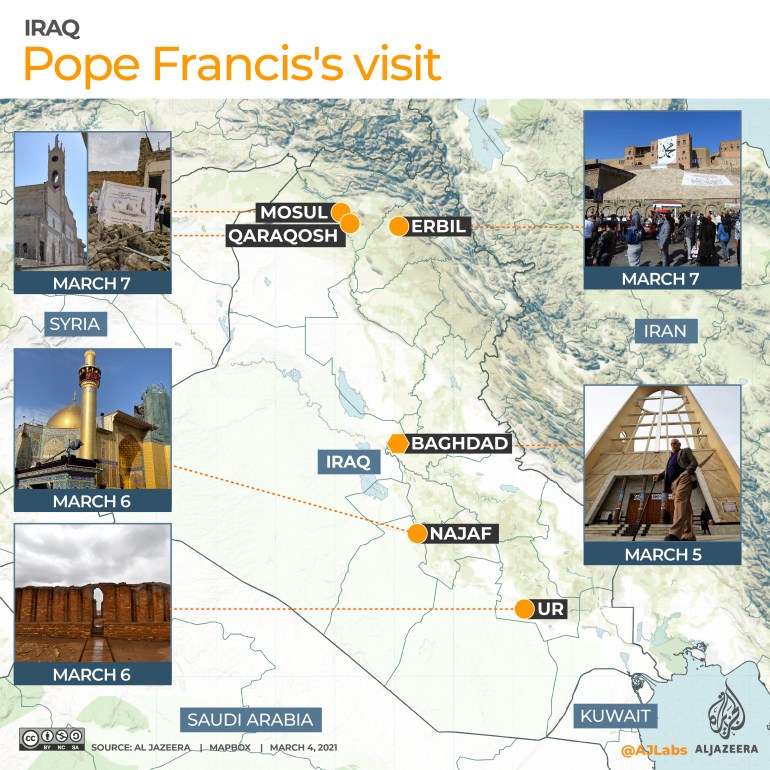Pope Francis urges Iraq’s Muslims, Christians to unite for peace
Pope Francis travelled to the ancient city of Ur in southern Iraq to reinforce his message of interfaith tolerance.

Pope Francis has urged Iraq’s Muslim and Christian religious leaders to put aside animosities and work together for peace and unity during an interfaith meeting in the traditional birthplace of the Prophet Abraham, father of their faiths.
“This is true religiosity: to worship God and to love our neighbour,” the pontiff told the gathering on Saturday.
Keep reading
list of 3 itemsDecades after the Gulf War, Iraq’s youth view oil as a curse
Pope arrives in Baghdad for the first ever papal visit to Iraq
Francis travelled to the ruins of Ur in southern Iraq to reinforce his message of inter-religious tolerance and fraternity during the first-ever papal visit to Iraq, a country riven by religious and ethnic divisions.
With a magnificent ziggurat nearby, Francis told the faith leaders that it was fitting that they come together in Ur, “back to our origins, to the sources of God’s work, to the birth of our religions” to pray together for peace as children of Abraham, the prophet common to Muslims, Christians and Jews.
“From this place, where faith was born, from the land of our father Abraham, let us affirm that God is merciful and that the greatest blasphemy is to profane his name by hating our brothers and sisters,” he said. “Hostility, extremism and violence are not born of a religious heart: they are betrayals of religion.”
The pope said there could never be peace as long as Iraqis viewed people of different faiths as the “other”.
“Peace does not demand winners or losers, but rather brothers and sisters who, for all the misunderstandings and hurts of the past, are journeying from conflict to unity,” he said.

Although Abraham is considered the father of Christians, Muslims and Jews, no Jewish representative was present at the inter-religious event in Ur.
In 1947, a year before Israel’s birth, Iraq’s Jewish community numbered about 150,000. Now their numbers are in single figures.
A local church official said Jews were contacted and invited but the situation for them was “complicated” particularly as they have no structured community. However, in similar past events in predominantly Muslim countries, a senior foreign Jewish figure has attended.
‘Challenges remain’
The pope, who began his three-day visit to Iraq in Baghdad on Friday, was expected to say mass later on Saturday at the capital’s Chaldean Cathedral of Saint Joseph.
Earlier on Saturday. Francis and Iraq’s top Shia Muslim leader delivered a powerful message of peaceful coexistence, urging Muslims in the war-weary Arab nation to embrace Iraq’s long-beleaguered Christian minority during an historic meeting in the holy city of Najaf.
Grand Ayatollah Ali al-Sistani said religious authorities have a role in protecting Iraq’s Christians, and that Christians should live in peace and enjoy the same rights as other Iraqis. The Vatican said Francis thanked al-Sistani for having “raised his voice in defence of the weakest and most persecuted” during some of the most violent times in Iraq’s recent history.
Al-Sistani, 90, is deeply revered in Shia-majority Iraq and his opinions on religious and other matters are sought by Shia Muslims worldwide.
On Sunday, Francis travels north to Mosul, a former ISIL (ISIS) stronghold, where churches and other buildings still bear the scars of conflict.
Renad Mansour, the project director of the Iraq Initiative and senior research fellow in the Middle East and North Africa programme at Chatham House, told Al Jazeera from London that the words of the pope matter as “they are symbols”.
“It is good for the Christians of Iraq as well as all Iraqis to have senior leaders, senior religious leaders come together and stress the importance of coexistence. But how does that translate into basic human rights, basic citizens’ rights for those Iraqis?” he said.
“From the perspective of the Iraqi leadership, this is a story of Iraq that is not what we have often heard from at least 2003 if not before, a story of conflict, a story of sectarianism. This is a story of trying to look to a better future, but of course, challenges remain.”